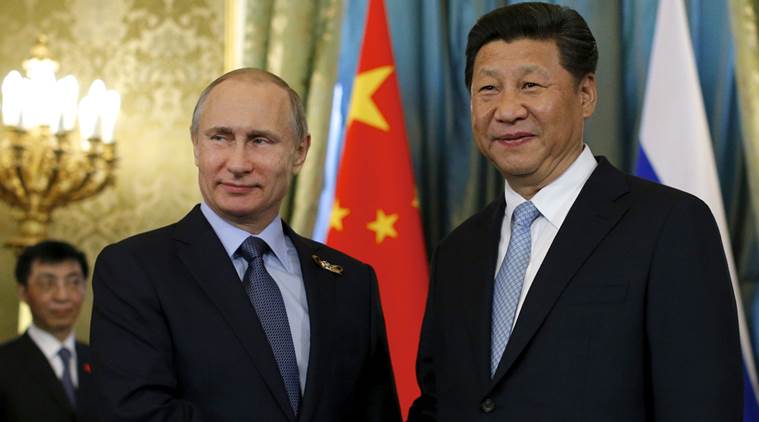
1. The China-Russia comprehensive strategic partnership of coordination focuses mostly on economic cooperation.
China officially refers to its relationship with Russia as a comprehensive strategic partnership of coordination. The two countries do not simply pursue military or security cooperation but work for comprehensive cooperation, especially in economics.
Sino-Russian economic cooperation has not amounted to much for a long time, with bilateral trade ranging from $50 billion to $60 billion. Significant changes have only occurred over the past couple of years. Bilateral trade exceeded $100 billion this year and is expected reach $200 billion in five years. That’s a huge number, especially for the Russian economy.
One area is Russian energy exports to China — an important part of energy security in both China and Russia. Russian energy was mainly exported to Europe in the past, but now it’s mainly exported to China, marking a huge change.
Another area is Russian agriculture, which is taking on increasing importance for China. The development of the Far East region of Russia is largely agricultural. Exports of Russian grain, beans and meat to China will increase on a large scale, which may change the mix of the country’s grain imports. A large part of China’s food and meat imports comes from the United States. This is a very sensitive issue in the Sino-U.S. trade war and it may lead to U.S. losses in agricultural exports. But if the trade war is protracted, China will have to consider importing more agricultural products from other sources, and Russia is an important one.
There is other development in Russia’s Far East region. Recently, for example, a highway bridge opened between Russia’s Blagoveshchensk and China’s Heihe, Heilongjiang province. It is one of two bridges across the Heilong River linking the two countries. The other is the Tongjiang-Nizhneleninskoye railway bridge, which also opened recently. The two countries had negotiated over the bridges for more than 10 years.
Overall, the considerable changes in China-Russia economic relations have significantly changed the structure of bilateral relations. Military security cooperation is increasingly turning into economic cooperation.
2. China and Russia will not become allies.
Significant changes have taken place in the external environment of Sino-Russian relations, the most important of which is the change in strategy by the United States. One of the most important of those is the U.S. switching what it identifies as its No. 1 rival from Russia to China. Against such a backdrop, what should China-Russia relations be like? Should they become allies? I don’t think so.
First, the concept of allies is itself outdated. Allies serve each other’s interests unconditionally. In the current situation, it seems that in the structure of the contemporary world, no country can serve another country’s interests unconditionally. There are always differing interests.
Second, the concept of allies worked in World War II and the Cold War, but it’s less effective under modern conditions. Are not the United States, the European Union and NATO all allies? Yes, but deep rifts have occurred, and I don’t believe Europe’s allies will follow the United States in working against China. Recently, the Republic of Korea and the United States also diverged on major issues, though they are still allies. America no longer has allies in the same way it did during the Cold War.
China and Russia are unlikely to adopt the old concept of alliance. Instead, the two countries respect each other’s core interests while also showing concern for each other’s special considerations. In some cases, when the countries’ special considerations are at odds, they can seek common ground while shelving differences under the major framework of comprehensive strategic coordination. Under that premise, China and Russia have agreed on many major issues and taken concerted action.
This is one manifestation of their strategic partnership of coordination. There will be differences on some specific issues, but the two sides will reach mutual understanding.
The problem in the world now is that the United States is constantly changing its original commitments and giving up on its responsibilities. China and Russia should join hands to keep the international order stable, rather than following the U.S. to change the world order.
In short, there are two main trends in the future development of China-Russia relations. One is that economic cooperation is becoming deeper and more comprehensive; the other is that the two countries will work to keep the international order stable in opposition to unilateralism.
3. Strategic mutual trust should be strengthened and cooperation should be deepened.
There is a high degree of strategic trust between China and Russia, but there is also distrust on minor issues partly due to unpleasant historical factors.
Distrust also stems from market competition. The rules of competition of the two are different, and so is their competitiveness. Micro-level cooperation between enterprises is sometimes difficult. Top leaders may agree, but at the level of enterprises, problems may arise over who gains or loses more.
China has many joint ventures with the West but few with Russia. Exchanges between the Chinese and Russian people, especially young people, are insufficient, and there is not much deep-level cooperation between universities. The number of international exchange students from China and U.S. who study in the counterpart country is much larger than the number between China and Russia.
In addition, there is insufficient trust regarding the Belt and Road Initiative. China-Russia cooperation in this regard has progressed slowly, even though China has made rapid progress in Central Asian countries.
Moreover, mutual understanding in the language and cultural fields for China and Russia needs to be strengthened. There is a shortage of Russian language talent in China. Internally, Russia needs to strengthen Chinese language education. Poor communication will cause problems. I propose that both China and Russia send more than 10,000 people each year to learn the other’s language.
